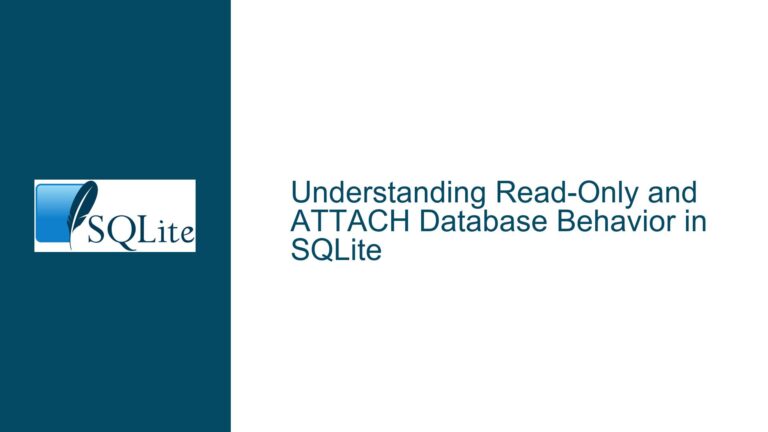Foreign Key Constraint Failure with Trigger and FTS Table Inserts in SQLite
Issue Overview: Foreign Key Constraint Failure During Trigger-Enabled Inserts
The core issue revolves around a foreign key constraint failure that occurs during a sequence of insert operations when triggers are enabled. The schema involves three main tables: mc, cc, and mc_cc, along with a virtual table mcFts for full-text search (FTS) functionality. The mc_cc table serves as a many-to-many relationship table between mc and cc, with foreign key constraints ensuring referential integrity. A trigger, mc_afterInsert, is defined to automatically insert data into the mcFts table whenever a new row is added to the mc table.
The problem manifests when attempting to insert data into the mc_cc table after inserting into mc and cc. The foreign key constraint fails, but only when the trigger is active. Without the trigger, the insert sequence proceeds without issues. This suggests that the trigger’s execution interferes with the foreign key validation process, likely due to the timing or order of operations.
The schema and insert statements are as follows:
CREATE TABLE mc (
id INTEGER PRIMARY KEY,
mcGuid TEXT NOT NULL UNIQUE,
fulltext TEXT COLLATE NOCASE
);
CREATE TABLE cc (
id INTEGER PRIMARY KEY,
cCode TEXT UNIQUE NOT NULL COLLATE NOCASE
);
CREATE TABLE mc_cc (
mc_id INTEGER NOT NULL REFERENCES mc(id),
cc_id INTEGER NOT NULL REFERENCES cc(id),
PRIMARY KEY (mc_id, cc_id)
) WITHOUT rowid;
CREATE VIRTUAL TABLE mcFts USING fts5 (fulltext, content='');
CREATE TRIGGER IF NOT EXISTS mc_afterInsert
AFTER INSERT ON mc
BEGIN
INSERT INTO mcFts(rowid, fulltext)
VALUES (new.id, new.fulltext);
END;
The insert sequence:
-- Insert into mc and get mc_id
INSERT INTO mc (mcGuid, fulltext)
VALUES (@mcGuid, @fulltext)
ON CONFLICT (mcGuid)
DO UPDATE SET fulltext=excluded.fulltext
RETURNING id AS mc_id;
-- Insert into cc and get cc_id
INSERT INTO cc (cCode)
VALUES (@cCode)
ON CONFLICT (cCode)
DO UPDATE SET other columns = excluded.other columns
RETURNING id AS cc_id;
-- Insert mc_id and cc_id into mc_cc
INSERT INTO mc_cc (mc_id, cc_id)
VALUES (@mc_id, @cc_id)
ON CONFLICT (mc_id, cc_id)
DO UPDATE SET
mc_id=excluded.mc_id,
cc_id=excluded.cc_id;
The error occurs at the third insert statement (INSERT INTO mc_cc) when the trigger is active. The error message indicates a foreign key constraint failure, suggesting that either mc_id or cc_id does not exist in their respective referenced tables at the time of the insert.
Possible Causes: Trigger Interference and Foreign Key Validation Timing
The issue is likely caused by the interaction between the trigger and the foreign key validation process. SQLite’s foreign key enforcement is immediate by default, meaning that the database checks the existence of referenced rows at the time of the insert. The trigger, which inserts data into the mcFts table, might be interfering with this validation process.
One possible cause is that the trigger’s execution alters the transaction state in a way that affects foreign key validation. When the trigger is active, the insert into mcFts occurs immediately after the insert into mc. This additional operation might cause SQLite to re-evaluate the foreign key constraints, leading to a failure if the referenced rows are not yet fully committed.
Another potential cause is the order of operations within the transaction. SQLite processes triggers as part of the same transaction as the original insert. If the trigger’s execution somehow delays or reorders the foreign key validation, it could result in a constraint failure. This is particularly relevant in complex transactions involving multiple tables and triggers.
Additionally, the use of ON CONFLICT clauses in the insert statements might complicate the situation. The ON CONFLICT behavior could interact unpredictably with the trigger and foreign key validation, especially if the conflict resolution involves updating existing rows.
Troubleshooting Steps, Solutions & Fixes: Resolving Trigger-Induced Foreign Key Failures
To resolve the issue, several approaches can be taken, ranging from schema adjustments to transaction management strategies.
1. Verify Data Types and Foreign Key References:
Ensure that the data types in the mc_cc table match those in the referenced tables. In the original schema, the mc_id and cc_id columns were mistakenly defined as TEXT instead of INTEGER. This mismatch could cause foreign key validation issues, especially if the trigger’s execution introduces additional complexity. Correcting the data types to INTEGER aligns the schema with the referenced tables and eliminates potential validation errors.
2. Simplify the Trigger Logic:
The trigger mc_afterInsert inserts data into the mcFts table immediately after an insert into mc. To reduce the risk of interference with foreign key validation, consider simplifying the trigger logic. For example, instead of performing the insert directly, the trigger could queue the operation for later execution. This approach defers the mcFts insert until after the foreign key validation is complete.
3. Use Deferred Foreign Key Constraints:
SQLite allows foreign key constraints to be deferred until the end of the transaction. By marking the foreign key constraints as deferred, the validation is postponed, giving the trigger more flexibility in its execution. To implement this, modify the mc_cc table definition as follows:
CREATE TABLE mc_cc (
mc_id INTEGER NOT NULL REFERENCES mc(id) DEFERRABLE INITIALLY DEFERRED,
cc_id INTEGER NOT NULL REFERENCES cc(id) DEFERRABLE INITIALLY DEFERRED,
PRIMARY KEY (mc_id, cc_id)
) WITHOUT rowid;
This change ensures that foreign key validation occurs at the end of the transaction, reducing the likelihood of conflicts with the trigger.
4. Adjust the Transaction Scope:
The issue might be related to the scope of the transaction. If the insert sequence is part of a larger transaction, consider breaking it into smaller, independent transactions. This approach isolates the trigger’s effects and prevents it from interfering with foreign key validation in other parts of the sequence.
5. Review Conflict Resolution Strategies:
The ON CONFLICT clauses in the insert statements might contribute to the issue. In the original schema, the ON CONFLICT behavior for mc_cc was set to update the existing row with the same values, which is redundant. Changing this to DO NOTHING simplifies the conflict resolution and reduces the risk of unexpected interactions with the trigger.
6. Debugging with Transaction Logs:
To gain deeper insight into the issue, enable SQLite’s transaction logging and analyze the sequence of operations. This approach helps identify the exact point where the foreign key validation fails and provides clues about the trigger’s impact on the transaction.
7. Consider Alternative FTS Integration:
If the trigger continues to cause issues, consider alternative methods for integrating FTS functionality. For example, instead of using a trigger, perform the mcFts inserts manually after the main insert sequence. This approach provides greater control over the timing and order of operations, reducing the risk of conflicts with foreign key validation.
By systematically addressing these potential causes and implementing the suggested solutions, the foreign key constraint failure can be resolved, ensuring smooth operation of the insert sequence even with triggers enabled.






